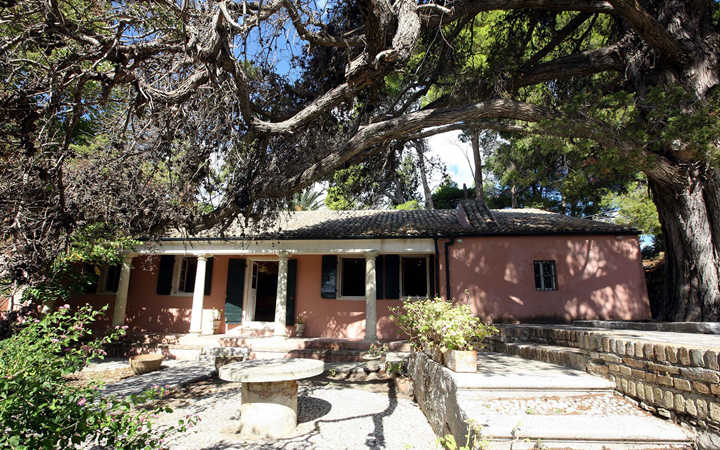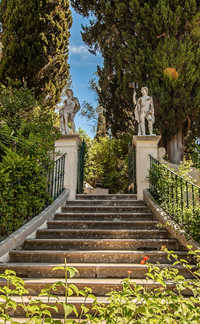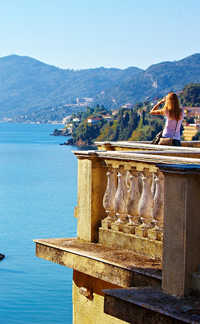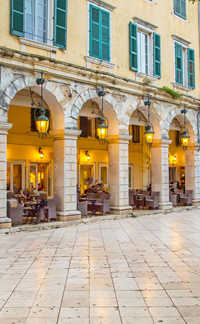“I dedicated my youth to his imperial Highness the Czar Alexander. I can do the same now for my people: offer my frail body as sacrifice to Greece”
Ioannis Capodistrias
The Capodistrias Museum
The Capodistrias Museum, is opening its doors to the public in 2016, after three years of extensive rennovation and redesigning of its permanent exhibition. It aims to become a reference point on the island's cultural map. The museum is a 7 klm drive from the port and Corfu town and is housed in the picturesque countryhouse of the Capodistrias family, in Evropouloi village.
“Our aim is to offer every visitor a journey through the history of Corfu, of Europe and of modern Greece. Ioannis Capodistrias, as corfiot aristocrat, european diplomat and First Governor of modern day Greece, is the ideal guide for such a journey”, says Mrs Daria Koskorou, the museum's new director.
The new permanent exhibition unfolds throughout the building, presenting authentic exhibits such as medallions, books, maps, religious icons, memorabilia that Ioannis acquired during his career in the service of Czar Alexander I, period furniture as well as a digital archive, a collection of archival material from all libraries and archives from all over Europe, pertaining to Capodistrias' life and achievements.
Ioannis Capodistrias
Ioannis Capodistrias (Corfu 1776-Naflion 1831) is a personality of great historical significance not only for greek history, but also for that of the Russians and of Europe in the early 19th century. Like many diplomats and politicians of his era, Capodistrias was also a man of letters. He studied medicine at the university of Padua in Italy, yet his interestes extended far beyond this. From his personal archive and library it is clear that he took an interest in History, Language, and matters of educational policy. In 1809, Czar Alexander I, invited him to Russia to join the staff of the Russian Ministry of Foreign Affairs. The Russian Empire was open to people of merit who shared an aristocratic backgroung, irrespective of their ethnic origin, who could be trusted to serve the state faithfully. During his carrer as a diplomat, he followed at first hand the great events that shook Europe, such as the Napoleonic Wars and the Vienna Congress of 1815. Capodistrias, as a close assistant to Czar Alexander, had been appointed Minister of Foreign Affairs in 1816, a post he shared with K. R. Nesselrode. He remained at his post until 1822, when he decoded to retire to Switzerland due to his disagreement with the Czar regarding the sovereing's policy towards the Greek Revolution. He resigned formally in 1827, following his decision to accept the Greeks' invitation to take on the government of the newly founded Greek State.
Capodistrias arrived in Greece in early 1828. He faced a country ravaged by war but was determined to set the foundations of a modern state. He began by giving priority to the country's recognition as a sovereign state, to the distribution of land to landless peasants, and to setting the foundations of an educatinal and administrative system. However, his measures met with serious resistance, mainly from traditional local elites who saw the new government as a threat to their priviliges. Capodistrias' failure to appease some of these opposition groups, led to his assasination in Naflion in 1831.
The Gardens
The museum is situated within luscious gardens overlooking the sea, the mountains of Epirus and Corfu town. The garden host a great variety of endemic plants, turning the surrounding landscape into the perfect frame for the historic countryhouse of the Caposistrias family. During the summer months, the museum's gardens will host exhibitions, concerts and other cultural functions.
Planning a visit
The museum offers visitors the option of an audio guide, as well as private or group guided tours. The audio guide tells the story of the Capodistrias family and takes visitors back in time, through european history. The audio guides are available in english, russian and greek. Private individual or group tours have to be arranged through contact with the museum.
Evropouloi, 49100 Kerkyra
+30 26610 39-528


















